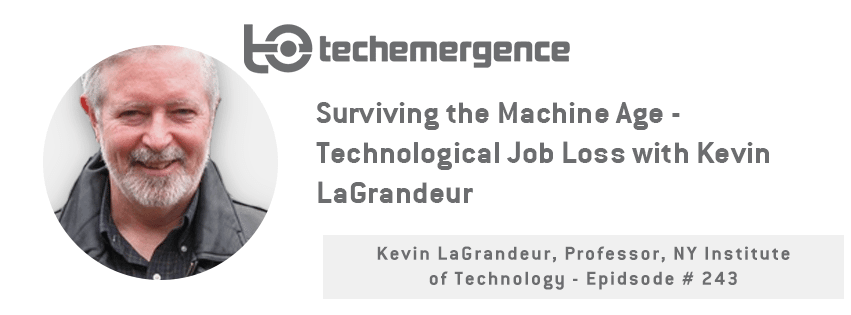Artificial intelligence is coming – should be worried about our jobs? Well, it depends. Our guest Dr. Kevin LaGrandeur spent the last two years researching the impacts of automation and artificial intelligence on society and the job market. In this interview on AI in Industry, we explore the near future of AI’s impact on the world of work, and I ask Kevin some important questions, including:
- What skills are least “automate-able” in the next decade?
- What middle class professions have the greatest risk of automation, and what should those professionals be doing now to hedge against job loss?
- What should business leaders be doing now to prepare for “phasing out” work while still taking care of their employees?
Listen to the full interview below on Soundcloud:
Guest: Dr. Kevin LaGrandeur, Professor / Director of Technical Writing Programs, New York Institute of Technology (NYIT)
Expertise: Sociology, technological unemployment, AI and robotics in popular culture
Brief recognition: Dr. LaGrandeur received his PhD in Philosophy from UC Irvine. He is author of Androids and Intelligent Networks in Early Modern Literature and Culture: Artificial Slaves (2012), and the recently released Surviving the Machine Age: Intelligent Technology and the Transformation of Human Work (2017). He has taught at NYIT since 1992, and is currently a Fellow at the Institute for Ethics in Emerging Technologies.
Big Idea
If you want to ensure job security, continue building career skills by “advancing sideways.” The ability to connect business contexts (for example: Marketing and business intelligence, or UX and programming) makes your work far less prone to automation.
Dr. LaGrandeur explained a number of important skill sets that are highly unlikely to be automated in the years ahead. The skills covered in this interview roughly break down into two categories:
- Skills Communication: In-person consultative sales positions, nursing positions, teaching positions, clergy, and any many other “high touch people skills” will be extremely hard to automate in the short term. Some more repetitive people skills (checkout clerks, outbound phone sales, bank tellers) have much higher likelihoods of being automated. The more rich detail and specialized knowledge required in the communications role – and the more variety of the role – the less it’s likely to be done by machines.
- Cross-Functional Effectiveness: Managing wide-ranging teams and projects is an ability that’s unlikely to be automated by AI in the near term. Machines tend to work well at optimizing or automating a specific challenge with a specific objective – but the more context and outside knowledge is involved, the harder it is for machines to do the job. A manager who ensures the smooth functioning of both design and product teams, or both marketing and sales teams, is more likely to have job safety than a front-line designer, developer, or even engineer.
Advice the Dr. LaGrandeur suggests for technical workers today include:
- Keep learning new skills on the job, exploring a combination of your own interests, and skills that seem pertinent for the success of your company.
- “Advance sideways” by learning to take your skills and integrating them into new projects and teams, broadening your contextual value to your firm with wider and wider context.
- Become an efficient manager of people and processes. Machine can execute on processes, but they rarely design workflows themselves – and while machines can sometimes perform the role of a person, they’re less likely to manage a team of people. These skills are bastions of safety from automation.
Interview Highlights with NYIT’s Kevin LaGrandeur
Listed below are some of the main questions that were posed to Kevin throughout the interview. Listeners can use the embedded podcast player (at the top of this post) to jump ahead to sections that they might be interested in:
- (3:00) What do you see as the most prominent impacts of AI in the job market in the near focus?
- (6:15) Are management and communication skills the “bastion of safety” from automation?
- (8:10) What other middle class jobs that will be changing in a big way?
- (11:00) Will people with a wider set of skills be more likely the be valuable to their companies over time?
- (13:10) What are the biggest automation concerns that business leaders should be planning for now?
- (22:00) What are some real precedents of the strategies (for both business and government leaders) for bypassing the risks of technological unemployment?
Related Material on Emerj
Our goal at Emerj is to be the #1 source for business and government leaders to learn about the practical applications of AI in their organization. We call it “staying on the right side of disruption,” making the right strategic plans and being prepared to use (or deal with) the technologies that will disrupt important industries and business functions.
Interviews with top executives and experts is part of what lets us help our readers “see around corners” and get a sense of the trends that matter. Each week, our AI in Industry Podcast (all episodes here) brings on a new AI executive or researcher to explain the applications and implications of AI in their domain of expertise.
If you’ve enjoyed today’s episode, you might enjoy some of our other interviews about technological unemployment and the impact of AI on the job market:
























